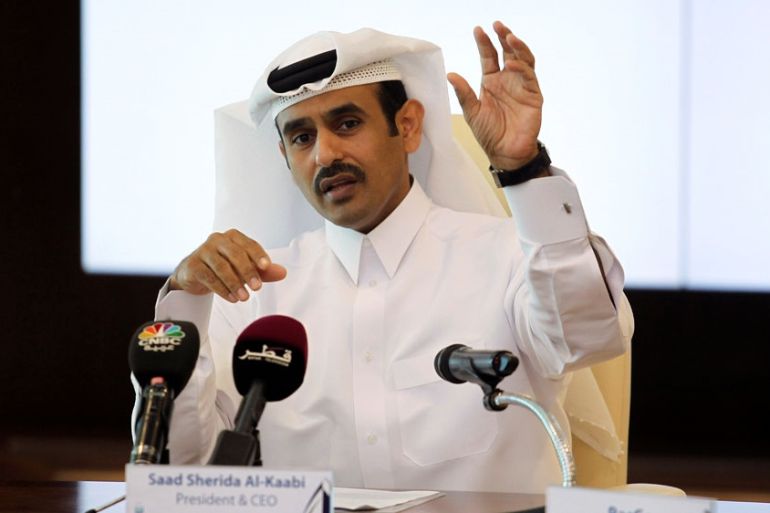Qatar energy minister weighs in on Saudi oil price war
Minister tells CNBC Saudi oil price war was a ‘big mistake’ and he sees energy demand recovering slowly.

Qatar’s Minister of State for Energy Affairs said Saudi Arabia made a big miscalculation when it launched an oil price war with Russia earlier this year, flooding an already saturated global market that was reeling from falling crude demand in the wake of coronavirus lockdowns.
“It was sort of a double-whammy where the market got hit in a very big way,” Saad al-Kaabi, who is also CEO of Qatar Petroleum, told business news network CNBC on Monday.
Keep reading
list of 3 itemsSaudi Arabia to impose ‘painful’ austerity measures, triple VAT
Saudi Arabia gaining an edge over competitors in oil market
“I think it was a very big mistake to flood the market,” he added. “Flooding the market is what caused us to go to a very low level. And then the pandemic basically took it almost to a very dangerous area where people could not afford to produce any more.”
In March, Riyadh announced it was lowering the price it charges for oil and would start pumping crude with abandon after it failed to convince Russia to agree to steep output cuts to offset a 30 million barrel a day blow to demand from the coronavirus pandemic.
The price war sent already pressured crude prices crashing early this year.
At the height of the rout, prices of US benchmark West Texas Intermediate crude turned negative as traders and investors paid to have oil taken off their hands rather than risk having nowhere to store it as crude storage neared capacity.
Faced with a potential wave of bankruptcies among higher-cost United States shale oil producers, Congressional lawmakers introduced legislation to punish Riyadh if it did not cut production by withdrawing US troops and military equipment from the kingdom.
After that legislation was introduced, President Donald Trump, who is seeking reelection this year, personally appealed to Saudi Arabia’s de facto leader, Crown Prince Mohammed bin Salman, and Russian President Vladimir Putin to reach a deal and rebalance the market.
Following Trump’s intervention, the Saudi-led Organization of the Petroleum Exporting Countries and its allies led by Russia agreed to a record-breaking production cut of 9.7 million barrels per day (bpd) for May and June. The grouping, known as OPEC+, agreed on Saturday to extend those curbs through July to keep propping up prices.
Qatar withdrew from OPEC in January 2019.
“Now, I think the actions that have been taken by the same group really is to agree what was agreed in the past and keep more sensible,” al-Kaabi told CNBC. “So, there is a shortage of that coordination in the beginning of the year, now I think it’s much better.”
Prices of global benchmark Brent crude have more than doubled from their April lows, but are still almost 40 percent down from where they started the year. On Tuesday, Brent finished the session at just above $41 a barrel.
Al-Kaabi said he is hopeful that energy demand will pick up as lockdowns ease across the globe, though he believes the recovery will be gradual.